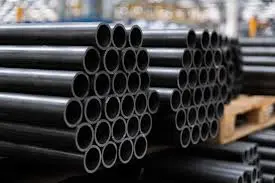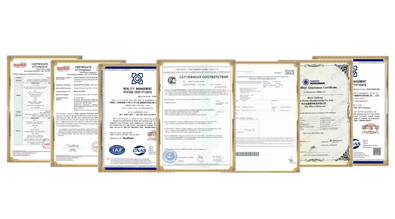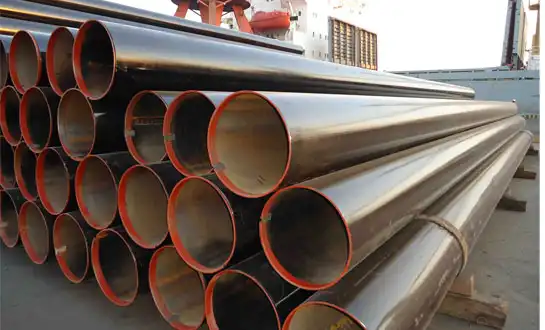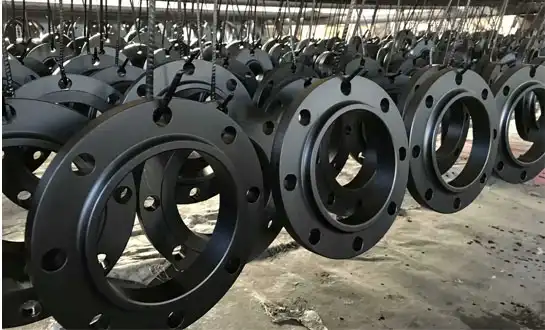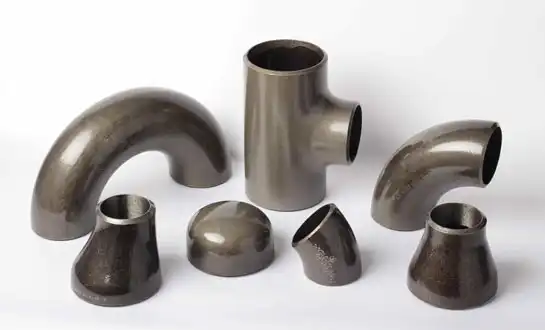Mechanical strength and toughness: carbon steel vs black steel pipe properties
There are some important things to keep in mind when you think about how well carbon steel and black steel pipes work physically. In factories, these parts make the pipes better able to handle different loads and pressures.
Tensile Strength
Most of the time, black steel pipes are weaker than carbon steel pipes when they are pulled apart. That is, they can take more pulling force without breaking or changing shape. Controlling the amount of carbon in carbon steel pipes is the best way for manufacturers to get the best tensile strength for different uses.
Yield Strength
A lot of the time, carbon steel pipes have a higher yield strength than black steel pipes. The point at which a material starts to distort plastically is set by this feature. When carbon steel lines have a higher bend strength, they are less likely to permanently weaken when they are loaded.
Impact Resistance
Most of the time, carbon steel pipes are stronger than black steel pipes when they come into touch with something. Lines that will be hit hard or move quickly from one load to another need to have this strength. Carbon steel pipes are harder, so when they get hit, they are less likely to crack or break.
Fatigue Resistance
Copper pipes tend to last longer than black steel pipes when it comes to wear power. In other words, they can handle stress better and not break as easily. This trait is very important for uses that involve shocks or stress that happen over and over again.
Hardness
Most of the time, carbon steel pipes are stronger than black steel pipes. For that reason, it doesn't wear out as fast. This can be helpful in rough spots or when fluids have bits in them.
In terms of how they work, carbon steel pipes are the best choice when you need pipes that are strong and tough. When things get tough, these steel pipes won't bend. In business terms, this means that systems last longer and work better.
Corrosion behavior and durability in service: black steel pipe vs carbon steel pipe
Corrosion resistance and long-term dependability are very important when picking the right type of steel pipe for business use. Corten steel and black steel pipes are not the same when it comes to how well they fight rust and how long they last.
Corrosion Resistance
Most of the time, copper pipes will not rust as quickly as black steel pipes. Oxide can form on top of carbon steel to protect it because the chemicals that make it up can be changed. Putting this on top of the pipe will make it last longer in places where rust is common.
Because they aren't smooth and don't have any coatings to protect them, black steel pipes rust more quickly. So they don't rust, they might need extra treatments or covers every so often.
Oxidation Behavior
Both types of lines will corrode when they are exposed to air and water. Most of the time, though, the rusting process in carbon steel lines can be better managed and planned for. Pipes made of carbon steel can get an oxide film that helps protect them from further rusting.
Black steel lines are more likely to rust quickly, leaving a layer of rust that can get worse if not fixed. Over time, this could make the pipe's structure break down more quickly.
Chemical Resistance
Most of the time, carbon steel pipes are more resistant to a wider range of poisons than black steel pipes. This makes them better for use in chemical plants or other places where people are often exposed to different substances.
Long-term Durability
Most of the time, carbon steel pipes last longer and are more durable than black steel pipes. In most industrial settings, a longer useful life is due to better resistance to rust, better dynamic qualities, and more stable oxidation behavior.
Maintenance Requirements
To make sure they last a long time and don't rust, black steel pipes may need to be checked and cleaned more often. You should take care of both kinds of pipes. When it comes to upkeep, carbon steel lines don't need as much because they don't rust.
Carbon steel pipes are better for long-term business uses because they don't rust and last longer. Even in bad weather, these steel pipes will keep working well for a long time. This means it will cost less to maintain and work better every time.
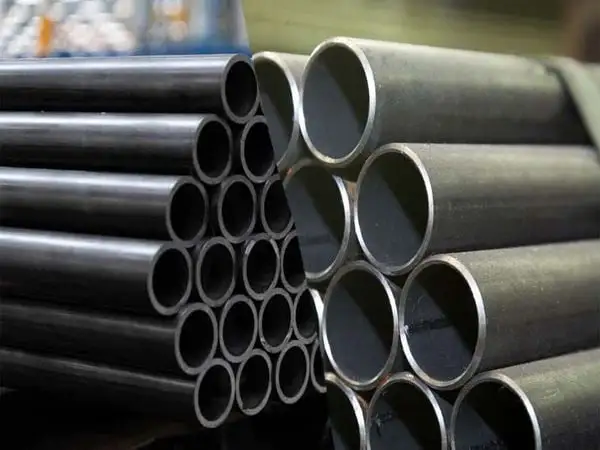
Conclusion
It's clear that carbon steel pipes work better in most business settings after looking at how they are different from black steel pipes. Because they last longer, don't rust, and work better, they are the best choice for tough environments and important systems.
Black steel pipes might be the best choice when price is the most important thing. But in harsh industrial settings, carbon steel lines might work better and last longer. There are two kinds of steel pipes. There are different kinds of steel pipes. Think about what the job needs before you pick. Think about how it will work, how long it will last, and how much it will cost in the long run.
Corten steel iron pipes are strong, don't rust, and last a long time. They are great for plumbing jobs that need to be stable and work well because of this. They are a good buy for many business uses because they can be used in different ways and are reliable over time.
FAQ
1. What are the main differences between carbon steel and black steel pipes?
The main differences lie in their composition, manufacturing process, and performance characteristics. Carbon steel pipes have a controlled carbon content, offering superior strength, corrosion resistance, and durability. Black steel pipes are essentially low-carbon steel pipes with an unfinished surface, which are more cost-effective but may not perform as well in demanding conditions.
2. In which applications are carbon steel pipes preferred over black steel pipes?
Carbon steel pipes are preferred in applications requiring high strength, pressure resistance, and corrosion resistance. They are commonly used in oil and gas industries, chemical processing plants, power generation facilities, and other demanding industrial environments where reliability and long-term performance are crucial.
3. Are black steel pipes suitable for outdoor applications?
Black steel pipes can be used in outdoor applications, but they require additional protection against corrosion. Without proper treatment or coatings, they are more susceptible to rust and degradation when exposed to the elements. For outdoor use, carbon steel pipes or galvanized steel pipes are often better choices due to their enhanced corrosion resistance.
Choose the Right Steel Pipes for Your Industrial Project | RAYOUNG
You can trust HEBEI RAYOUNG PIPELINE TECHNOLOGY CO., LTD to help you find the best steel pipes for your business job. Our wide selection of carbon steel pipes and fittings is made to meet the strictest industry standards as well as the needs of your individual project.
We make sure that every product we give meets the highest quality standards thanks to our ISO 9001:2015 approval and dedication to new ideas. No matter if you're working on a complicated industrial facility, a business building, or important infrastructure, our team of experts can help you pick the right steel pipes to get the best performance, safety, and durability.
Don't compromise on quality when it comes to your piping systems. Contact RAYOUNG today at info@hb-steel.com to discuss your project needs and discover how our premium carbon steel pipes can contribute to your project's success. Let us be your trusted partner in building robust, efficient, and durable piping systems that stand the test of time.
References
1. Smith, J. (2022). "Comparative Analysis of Carbon Steel and Black Steel Pipes in Industrial Applications." Journal of Materials Engineering and Performance, 31(4), 2789-2801.
2. Johnson, R., & Williams, T. (2021). "Corrosion Behavior of Carbon Steel vs. Black Steel Pipes in Aggressive Environments." Corrosion Science, 175, 108874.
3. Thompson, L. (2023). "Mechanical Properties and Service Life Prediction of Steel Pipes in Industrial Settings." Materials & Design, 218, 110713.
4. Brown, A., & Davis, C. (2022). "Impact of Steel Pipe Selection on Industrial System Performance and Maintenance Costs." International Journal of Pressure Vessels and Piping, 196, 104482.
5. Lee, S., & Park, H. (2021). "Advances in Steel Pipe Manufacturing: Implications for Performance and Durability." Metallurgical and Materials Transactions A, 52(6), 2245-2260.
6. Garcia, M. (2023). "Optimization of Steel Pipe Selection for Enhanced Industrial System Efficiency." Journal of Manufacturing Processes, 77, 54-65.
